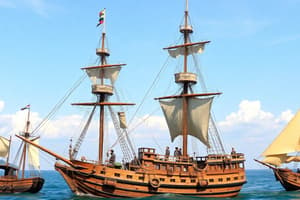Podcast
Questions and Answers
Quel explorateur italien est crédité de la découverte de l'Amérique en 1492?
Quel explorateur italien est crédité de la découverte de l'Amérique en 1492?
Christopher Columbus
Quel était l'objectif initial de Christopher Columbus en se lançant dans ses voyages vers l'ouest?
Quel était l'objectif initial de Christopher Columbus en se lançant dans ses voyages vers l'ouest?
Trouver une nouvelle route maritime vers l'Asie.
Quels aliments ont été introduits en Europe suite à la colonisation des Amériques?
Quels aliments ont été introduits en Europe suite à la colonisation des Amériques?
Tomates, piments, chocolat et maïs.
Quel impact la découverte de l'or et de l'argent en Amérique a-t-elle eu sur les puissances européennes?
Quel impact la découverte de l'or et de l'argent en Amérique a-t-elle eu sur les puissances européennes?
Comment les colonies espagnoles en Amérique étaient-elles caractérisées?
Comment les colonies espagnoles en Amérique étaient-elles caractérisées?
Quelle expédition de Christophe Colomb a mené à la découverte de l'Amérique en 1492?
Quelle expédition de Christophe Colomb a mené à la découverte de l'Amérique en 1492?
Quel empire amérindien a été conquis par Hernán Cortés en 1519-21?
Quel empire amérindien a été conquis par Hernán Cortés en 1519-21?
Quelle colonie a été établie par les Anglais en 1620 pour offrir refuge aux dissidents religieux?
Quelle colonie a été établie par les Anglais en 1620 pour offrir refuge aux dissidents religieux?
Quelle entreprise a établi la Colonie de la Baie du Massachusetts en 1629?
Quelle entreprise a établi la Colonie de la Baie du Massachusetts en 1629?
Quelle compagnie a été responsable de l'établissement de la Colonie de la Nouvelle-France en 1627?
Quelle compagnie a été responsable de l'établissement de la Colonie de la Nouvelle-France en 1627?
Study Notes
The discovery of America and the subsequent colonization by European powers are significant topics in world history. This article will delve into the exploration, colonization, and impact of European powers, specifically focusing on Christopher Columbus, the progress of marine navigation, and the establishment of colonial empires.
Christopher Columbus and His Discovery
Christopher Columbus, an Italian explorer sailing under the Spanish flag, is credited with the discovery of America in 1492. Although he was looking for a new sea route to Asia, his accidental encounter with the Americas changed the course of world history. Columbus's voyages opened up a new world to European exploration and colonization, leading to the establishment of Spanish and Portuguese colonies in Central and South America.
Impact of Colonization
The colonization of the Americas brought about significant changes. New foodstuffs like tomatoes, chili peppers, chocolate, and corn were introduced, which altered cuisines around the globe. The discovery of gold, silver, and other resources in the Americas led to increased interest in colonization among European powers. The labor demands in the newly established colonies led to the exploitation of Native Americans and the introduction of African slavery.
Colonial Empires
The Spanish colonies in Central and South America were characterized by the conquest of indigenous peoples and the establishment of large-scale settlements. The Spanish dream of finding great riches in the Americas was realized when Hernán Cortés conquered the Aztec Empire in Mexico in 1519-21. The Spanish also established colonies in Florida in the 1500s.
The English colonies, on the other hand, were founded under different circumstances. The Mayflower arrived at Plymouth Rock in 1620, and the Massachusetts Bay Colony was established in 1629. These colonies were not primarily economic ventures but places of refuge for religious dissenters seeking to create their vision of an ideal Christian community in the New World.
The Dutch began their interest in the region that became present-day New York in the early 1600s, and the French built Quebec in 1608. Within another generation, various European powers began sending thousands of colonists to North America, including families, to establish colonies like the Plymouth Company (1620), the Massachusetts Bay Company (1629), the Company of New France (1627), and the Dutch West India Company (1621).
Progress of Navigation Marine
The exploration and colonization of the Americas were facilitated by the advances in marine navigation. Europeans had been on a quest for new trade routes to Asia since the 15th century, and Columbus's accidental discovery was a result of this endeavor. The success of these voyages led to the establishment of permanent settlements, trade networks, and the exploitation of resources in the Americas.
The discovery of America and the subsequent colonization by European powers had profound and lasting impacts on history. It led to the spread of European culture, the exploitation of resources, and the introduction of new foodstuffs and agricultural practices. It also resulted in the displacement and oppression of indigenous peoples and the introduction of African slavery. Understanding this period and its consequences is crucial for comprehending the development of modern societies.
Studying That Suits You
Use AI to generate personalized quizzes and flashcards to suit your learning preferences.
Description
Découvrez l'exploration, la colonisation et l'impact des puissances européennes en Amérique, en mettant l'accent sur Christophe Colomb, les progrès de la navigation maritime et l'établissement des empires coloniaux.




